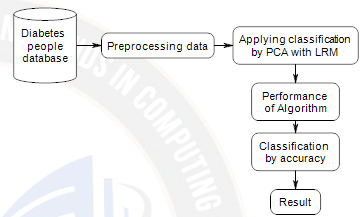Training and Classification of PCA with LRM model for Diabetes Prediction
Main Article Content
Abstract
There are exponential increase in the number of families who are diagnosed by diabetes mellitus because of lifestyle and other non-determinable factors. Most of the patients are least bothered about the consequences they face or about the danger factor that approaches them. In this, we have established a novel model predicting the type 2 diabetes mellitus (TD2M) dependent on information digging methods. The main constraints are that we are trying to enhance the precision of the expected model and to not limit the model with just one data set. The model contains the improved NB, DT, KSTAR, LOGISTIC REGRESSION, SVM compared to the pre-processing techniques. To compare our outcome and the outcomes from different scientists we use Pima Indians diabetes data set and the Waikato environment for knowledge analysis toolbox. Apart from these, the model which we expect to implement have adequate data set quality. For more analysis, we applied it to two more diabetic datasets. These two provides satisfied outcomes. Henceforth, the model is set to be valuable for the betterment in the field of diabetology..
Article Details
References
Riccardo B, Blaz Z. “Prescient information mining in clinical medication: recent concerns and rules”. Int J Med Inf 2008;77:81–97.
Mechelle Gittens, Reco King, Curtis Gittens and Adrian Als, “Post- conclusion Management of Diabetes through a Mobile Health Consultation Application”, 2014 IEEE sixteenth International Conference on e-Health Networking, Applications and Services (Healthcom).
Marcano-Cede~no Alexis, Torres Joaquín, Andina Diego. “A forecast model to diabetes utilizing fake metaplasticity” IWINAC 2011, Part II. LNCS 6687; 2011. p. 418–25.
Veena Vijayan V. furthermore, Anjali C.”Decision emotionally supportive networks for anticipating diabetes mellitus– a survey” Procedures of 2015 worldwide meeting on correspondence innovations (GCCT 2015).
Ms. K Sowjanya, MobDBTest: “An AI based framework for anticipating diabetes hazard utilizing cell phones” 2015 IEEE International Advance Computing Conference (IACC).
Gang Shi, Shanshan Liu and Ding Ye”Design and Implementation of Diabetes Risk Assessment Model Based On Mobile Things” 2015 seventh International Conference on Information Technology in Medicine and Education.
Juntao Wang and Xiaolong Su “An improved K-Means grouping calculation” 2011 IEEE third International Conference on Communication Software and Networks (ICCSN).
Yanhui Sun, Liying Fang and Pu Wang,”Improved k-implies bunching dependent on Efros distance for longitudinal information” 2016 Chinese Control and Decision Conference (CCDC).
Shunye Wang, “Improved K-implies bunching calculation dependent on the enhanced starting centroids” 2013 third International Conference on Computer Science and Network Technology (ICCSNT).
Phattharat Songthung and Kunwadee Sripanidkulchai, “Improving Type 2 Diabetes Mellitus Risk Prediction Using Classification” 2016 thirteenth International Joint Conference on Computer Science and Software Engineering (JCSSE).
Madhavaram Swapna, D.William Albert (2021). Minimal Rule Based Classifier on Diabetic Dataset Using Machine Learning Techniques. International Journal of Computer Engineering in Research Trends, 8(12), 204-210.
Sarangam Kodati, R P. Singh (2017).Comparative Performance Analysis of Different Data Mining Techniques and Tools Using in Diabetic Disease. International Journal of Computer Engineering in Research Trends, 4(12), 556-561.
Ghatage Trupti B, Takmare Sachin B(2016). High Dimensional Data Clustering with Hub Based DEC. International Journal of Computer Engineering in Research Trends, 3(2), 62-66.
Kumar, M. & Pathak, Rashmi & Gunjan, Vinit. (2022). Diagnosis and Medicine Prediction for COVID-19 Using Machine Learning Approach. 10.1007/978-981-16-8484-5_10.

